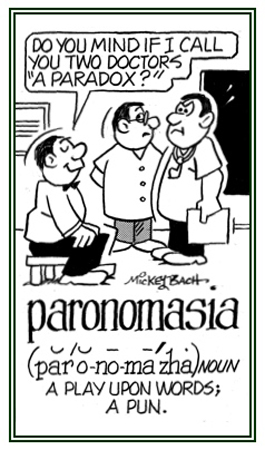dox-, -doxy, dog-, dogma-, dogmato-
(Greek: believe, belief; that which is thought to be true by someone who has the power or right to give orders, make decisions, and to enforce his or her opinions, doctrines, praise, or beliefs)
doxological
Pertaining to or of the nature of a doxology; praising, glorifying.
doxology
A short formula (hymn or statement) of praise to God; especially, one in liturgical use; specifically, the Gloria in excelsis or “Greater doxology”, the Gloria Patri or “Lesser doxology”, or some metrical formula, such as the verse beginning “Praise God from whom all blessings flow.”
doxy
Opinion; especially, in religious or theological matters.
heterodox, heterodoxal (adjective), more heterodoxal, most heterodoxal
Relating to a person holding opinions not in accord with some acknowledged standard; as in theology or in other matters of belief or opinion: Heterodox doctrines, opinions, etc. are not in accordance with established principles or views, or those generally recognized as right or orthodox (originally in religion and theology).
The deviation from what is considered to be orthodox; the quality or character of being heterodox: Heterodoxies are opinions or doctrines that are at variance with that which is generally received as true or right, like a heterodox opinion, a belief or doctrine that is not in agreement with what is generally accepted.
homodox
Of the same opinion.
homodoxian
A person of the same opinion or belief.
neodox
Holding new views or beliefs.
neodoxy
A new doctrine or view.
orthodox
1. Holding right or correct opinions, i.e. such as are currently accepted as correct, or are in accordance with some recognized standard; such as, in theology or other subjects (science, medical, etc.).
2. Of opinions or doctrines; right, correct, true; in accordance with what is accepted or authoritatively established as the true view or right practice; originally, in theological and ecclesiastical doctrine.
3. Correct or sound in doctrine; holding the commonly accepted faith, established doctrines, etc.
2. Of opinions or doctrines; right, correct, true; in accordance with what is accepted or authoritatively established as the true view or right practice; originally, in theological and ecclesiastical doctrine.
3. Correct or sound in doctrine; holding the commonly accepted faith, established doctrines, etc.
People are usually more firmly convinced that their opinions are precious than that they are true.
orthodoxism
The quality of being orthodox; orthodoxy.
orthodoxy, orthodoxical
The quality or character of being orthodox; belief in or agreement with what is, or is currently held to be; right, especially, in religious matters.
1. A statement or belief that is contrary to a received opinion or belief; often with the implication that it is marvellous or incredible: Sometimes a paradox has an unfavorable connotation, as being in a disagreement with what is held to be an established truth, and hence absurd or fantastic; sometimes with a favorable connotation, as a correction of some error.
2. An expression or proposition, which, on the face of it, seems self-contradictory, absurd, or at variance with common sense: After an examination or when explained, a paradox may prove to be well-founded or true.
3. A person, situation, or something that is considered, in itself, to be contradictory to reason or truth: It is a paradox when some computer programs often need special upgrading; especially, since they are supposed to exist in order to save time for users.
4. Etymology: from Latin paradoxum, "paradox, a statement seemingly absurd yet really true"; from Greek paradoxon; a noun use of the neuter of adjective paradoxos, "contrary to expectation, incredible" from para-, "contrary to" + doxa, "opinion"; from dokein, "to appear, to seem, to think".

© ALL rights are reserved.

© ALL rights are reserved.
Go to this Word A Day Revisited Index
2. An expression or proposition, which, on the face of it, seems self-contradictory, absurd, or at variance with common sense: After an examination or when explained, a paradox may prove to be well-founded or true.
3. A person, situation, or something that is considered, in itself, to be contradictory to reason or truth: It is a paradox when some computer programs often need special upgrading; especially, since they are supposed to exist in order to save time for users.
4. Etymology: from Latin paradoxum, "paradox, a statement seemingly absurd yet really true"; from Greek paradoxon; a noun use of the neuter of adjective paradoxos, "contrary to expectation, incredible" from para-, "contrary to" + doxa, "opinion"; from dokein, "to appear, to seem, to think".
The following cartoons present humorous deviations that illustrate that a paradox could be something amusing; such as, two doctors or a pair of docs.


Go to this Word A Day Revisited Index
so you can see more of Mickey Bach's cartoons.
paradoxical
1. Contrary to common opinion.
2. Apparently inconsistent with itself, or with reason, though in fact true; also, really inconsistent with reason, and so, absurd or irrational.
3. Exhibiting some contradiction with known laws or with itself; not in accordance with what is theoretically reasonable or possible; now said especially of natural phenomena that deviate from the normal or are hard to reconcile with known scientific laws.
2. Apparently inconsistent with itself, or with reason, though in fact true; also, really inconsistent with reason, and so, absurd or irrational.
3. Exhibiting some contradiction with known laws or with itself; not in accordance with what is theoretically reasonable or possible; now said especially of natural phenomena that deviate from the normal or are hard to reconcile with known scientific laws.
paradoxism
The utterance or practice of paradox.


